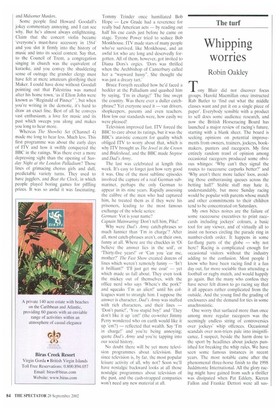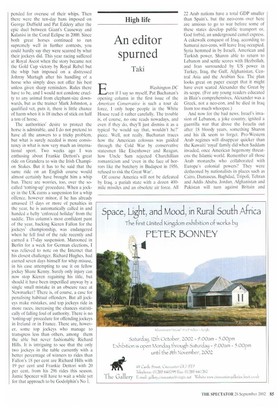Whipping worries
Robin Oakley
Tony Blair did not discover focus groups. Harold Macmillan once instructed Rab Butler to 'find out what the middle classes want and put it on a single piece of paper'. Everybody sensible with a product to sell does some audience research, and now the British Horseracing Board has launched a major review of racing's future, starting with a blank sheet. The board is seeking opinions on potential improvements from owners, trainers, jockeys, bookmakers, punters and racegoers. My first entirely random trawl of opinion among occasional racegoers produced some obvious whinges: 'Why can't they signal the routes to racecourse carparks better?' and 'Why aren't there more ladies' loos, avoiding those embarrassing queues across the betting hall?' Stable staff may hate it, understandably, but more Sunday racing would be popular with parents whose match and other commitments to their children tend to be concentrated on Saturdays.
My own betes noires are the failure of some racecourse executives to print racecards including jockeys' colours, a basic tool for any viewer, and of virtually all to insist on horses circling the parade ring in number-cloth order. It happens in some far-flung parts of the globe — why not here? Racing is complicated enough for occasional visitors without the industry adding to the confusion. Most people I know who have been racing find it a fun day out, far more sociable than attending a football or rugby match, and would happily go again. But the many who confess they have never felt drawn to go racing say that it all appears rather complicated from the outside. And the young find the grading of enclosures and the demand for ties in some anachronistic.
One worry that surfaced more than once among more regular racegoers was the seemingly endless string of controversies over jockeys' whip offences. Occasional scandals over non-triers pale into insignificance, I suspect, beside the harm done to the sport by headlines about jockeys punished for breaking the whip rules. We have seen some famous instances in recent years. The most notable came after the phenomenal three-horse finish to the 1998 Juddmonte International. All the glory racing might have gained from such a thriller was dissipated when Pat Eddery, Kieren Fallon and Frankie Dettori were all sus
pended for overuse of their whips. Then there were the ten-day bans imposed on George Duffield and Pat Eddery after the epic duel between Giant's Causeway and Kalanisi in the Coral Eclipse in 2000. Since both great horses continued to run supremely well in further contests, you could hardly say they were scarred by what their jockeys did. This year racing suffered at Royal Ascot when the story became not the Gold Cup victory by Royal Rebel but the whip ban imposed on a distressed Johnny Murtagh after his handling of a horse who simply does not offer his best unless given sharp reminders. Rules there have to be, and I would not condone cruelty to any animal from elephant-size downwards, but as the trainer Mark Johnston, a qualified vet, puts it, there is little chance of harm when it is 18 inches of stick on half a ton of horse.
The authorities' desire to protect the horse is admirable. and I do not pretend to have all the answers to a tricky problem, but what is surely needed is more consistency in what is now very much an international sport. Two weeks ago I was enthusing about Frankie Dettori's great ride on Grandera to win the Irish Champion Stakes. But it has to be said that the same ride on an English course would almost certainly have brought him a whip ban. There are worries, too, over the socalled 'totting-up' procedure. When a jockey in the UK earns a suspension for a whip offence, however minor, if he has already amassed 15 days or more of penalties in the year, he is automatically called in and handed a hefty 'enforced holiday' from the saddle. This column's most confident punt of the year, backing Kieren Fallon for the jockeys' championship, was endangered when he fell foul of the rule recently and earned a 17-day suspension. Marooned in Berlin for a week for German elections, I was relieved to note on the Internet that his closest challenger, Richard Hughes, had earned seven days himself for whip misuse, in his case attempting to use it on fellow jockey Shane Kenny. Surely only injury can now stop Kieren regaining his title, but should it have been imperilled anyway by a single small mistake in an obscure race at Newmarket? There is, of course, a case for penalising habitual offenders. But all jockeys make mistakes, and top jockeys ride in more races, increasing the chances statistically of falling foul of authority. There is no `totting-up' procedure for offending jockeys in Ireland or in France. There are, however, some top jockeys who manage to transgress less than others, among them the able but never fashionable Richard Hills. It is intriguing to see that the only two jockeys in the table currently with a better percentage of winners to rides than Fallon's 18 per cent are Richard Hills with 19 per cent and Frankie Dettori with 20 per cent, from his 296 rides this season. Jamie Spencer will have to wait a while yet for that approach to be Godolphin's No 1.



































































































 Previous page
Previous page